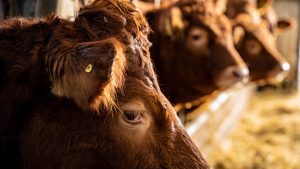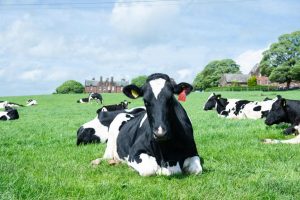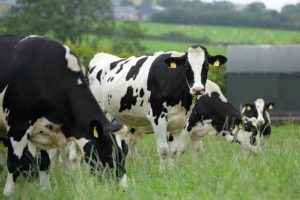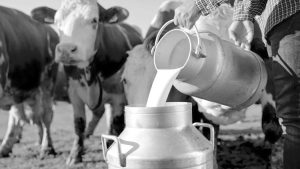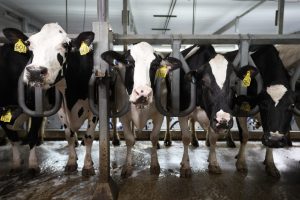
The shortage of competent people, with the right skills, willing to work in the dairy sector appears to be at a critical point – and Port William-based Mr Christie reckons that something fundamental needs to change to make dairying an attractive career option.
In the absence of spare cash to throw at increasing salaries, Mr Christie is instead looking at his employees work/life balance, and proposing an entirely new shift model of four days on and four days off.
Mr Christie currently employs 12 people across a dairy unit and a pig unit, tending to 1100 grass-fed milkers and 200 sows, finishing 6000 pigs a year.
“I currently have some great staff and in the past our business was fired by time-served stock and tradesmen,” said Mr Christie. “When I came out of college in 1995, there were 55 people under my charge.
“We have rationalised since, reinvested in the business, and have consistently topped the rankings for productivity and quality. You would think it would be easy to recruit. But it isn’t.
“The problem is the agricultural worker works too hard and doesn’t get paid enough for it, as do farmers,” he said. “That is a symptom of the cheap food trap that farming finds itself in, as successive governments have built their economic strategy around reducing the amount of disposable income the public spends on food, so they’ll have more to spend on non-essentials. There is not enough money going back down the food chain to provide adequate reward to the primary producer and their employees.
“But at the same time we have had Boris Johnson saying that he wants a high wage economy! Nicola Sturgeon has also said that Scotland could have a four-day week, to improve people’s work life balance. So here at Dourie, we have taken those messages onboard, and decided to break the mould.”
Mr Christie said his farm needed high quality reliable staff, with consistently high technical performance: “And you can’t expect that from people working 70 hours a week on a minimum agricultural wage.”
“But I cannot offer £60k a year – so there needs to be some extra incentive to come work here.”
The solution – or at least an attempt at a solution – is to create dairy jobs running on a four days on, four days off rota – or possibly on an eight days on, eight days off rota. The aim, as Rory makes clear, is to give people a new flexibility that might tempt them into the hard graft of dairying, giving their all to the job on the days that they are on – but with new freedom to pursue other interests on the equal amount of time they will be off.
“The norm right now is 10 days on, four days off. Some of the people already in that regime are happy with it, but it isn’t a tempting offer to potential new starts.
“On four days on, four days off, you might choose to go drive a truck for those other days, maximise your income. Or go have a life, have hobbies, be with your family.
“On eights days on, eight days off, you might just about see the worth in commuting from Birmingham – or wherever – to live and work here,” he speculated.
“I want workers here to have good wellbeing, to have a good quality of life – to turn up for work refreshed and committed, knowing that there lives are their own, and they have flexibility.
But he is clear that Dourie will need enough people to embrace this new model for it to work – by its very nature, the reduction in days worked and increase in days off means more people are needed to cover the farm’s workload, so the Christies cannot properly launch the system without at least four workers with the right attitude and the right competencies to make it fly.
But where will these workers be coming from? Rory is supremely open-minded about that.
“We are interested in graduates from the UK’s agricultural colleges, certainly, but we would take people from any country if they have the right skills.”
Of course, post-Brexit, taking people from other countries is neither simple, nor cheap.
“We have been through the sponsorship process needed to bring people in from overseas, and once that and the visas are paid for, you don’t see much change out of £10k per person,” he warned.
But is this labour shortage a Brexit issue? Rory’s answer is more nuanced than most ‘Brexit’ questions receive.
“This is a problem that was here long before Brexit. But Brexit has highlighted and intensified the problem. The root issue is the cheap food economy that UK farming has been trapped in.
“Our ability to bring cheap Eastern European workers in to fill these farmworker and food sector roles allowed the cheap food trap to continue. It gave the industry a way of cutting its costs to cope with the low returns from the big buyers.
“The system exploited the hunger of these workers from the East to sustain itself and keep food prices artificially low for UK consumers. Now Brexit has cut off that supply of cheap workers, the question is, do we look for another source of cheap workers, or do we abandon that way of doing things? This is definitely the right time to try and do things differently.”
Mr Christie’s four-day week offer has reportedly ‘stirred the pot’ of the wider dairy sector, as nothing like it has been tried before – and others are watching closely to see if it succeeds in bringing in suitable workers.




